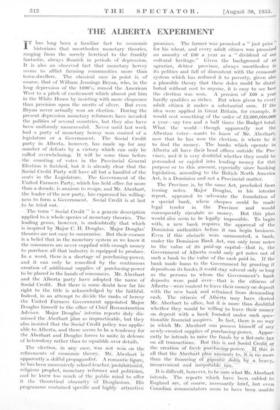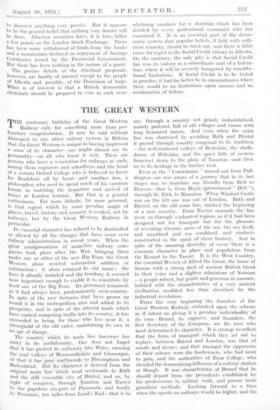THE ALBERTA EXPERIMENT
TT has long been a familiar fact to economic -L historians that unorthodox monetary theories, ranging • from the merely heretical to the frankly 'fantastic, always flourish in periods of depression. It is also an observed fact that monetary heresy seems to allliet farming communities more than town-dwellers. The classical case in point is, of .course, that of William Jennings Bryan, who, in the
• long depression of the 1890's,1 roused the American West to a pitch of excitement which almost put him in the White House by insisting with more eloquence than precision upon the merits of silver. But even Bryan never actually won an election.' During the present depression monetary reformers have invaded the politics of several countries, but they also have been uniformly unsuccessful. Never until last week had a party of monetary heresy won control of a legislature or a Government. The Social Credit party in Alberta,. however, has 'made up for any .number of defeats by a victory which can only be called overwhelming. It will be some time before the counting of votes in the Provincial General Election is finished, but it is already .clear that the Social. Credit Party will have all but a handful of the .seats in the Legislature. The Government of the United Farmers Party, which has held office for more than a decade, is anxious to resign, and Mr. Aberhart, the leader of the new party, has expressed his willing- , ness to.. form a Government.. Social Credit is at last to be :tried out.. .
,The term " Social Credit " is a generic description applied ,to..a whole (species of monetary theories. The leading genus, however, is undoubtedly that which is inspired by Major C. H. Douglas. Major Douglas' theories are not easy to summarise. But their essence is a belief that in the Monetary system as we know it the consumers are never supplied with enough money to purchase all that industry is equipped to produce. In a word, 'there is a shortage of purchaSing-power, and can only be remedied by the continuous creation of . additional supplies of purchasing-power to. be‘placed in the hands 'of consumers. Mr. Aberhart and the Alberta' party have adopted the name of Social. Credit. But there is some doubt how far his right to the title is acknowledged by the 'faithful. Indeed, in an attempt to divide the ranks of heresy the United Farmers' Government appointed Major Douglas himself to the 'office of Chief Reeonstruction Adviser.. Major Douglas' interim reports duly dis- missed the Aberhart Plan as impracticable, but they also insisted that the SOcial Credit policy was appli.C.2 able to Alberta, .and there seems to be a tendency for the Aberhart and Douglas forces to unite in defenee of heterodoxy rather than to squabble over details.
The 'election, in any case, was not won on the refinements of economic theory. Mr. Aberhart is apparently a skilful propagandist. A romantic figure, he has been successively school-teacher, ProhibitiOnist, religious prophet, monetary 'reformer and politician, and he kneW too much of the public mind to offer it the theoretical obscurity of DonglaSisin. His programme contained Specific and highly attraCtiVe
promises.' The farmer was promised a " just price " for his wheat, and every adult citizen was promised an annuity of £60 a year as a " dividend of our cultural heritage." Given the background of an agrarian, debtor province, always unorthodox io its politics and full of discontent with the economic system which. has reduced it to poverty, given also a plausible theory that these doles could be distri- buted without 'cost to anyone, it is. easy to see how the election was won. A' pension Of ils' a year hardly qualifies as riches. But when given to every adult citizen it makes a substantial sum. If the 'idea were applied in Great Britain, for example, it would cost something of the order of £2,000,000,000 a year—say two and a half times the Budget total. What the world — though apparently not the Albertan voter—wants to know of Mr. Aberhart, now that he has won the election, is where he is to find the money. The banks which operate in Alberta all have their head offices outside the Pro- vince, and it is very doubtful whether they could be persuaded • or cajoled into lending money for this purpose Or to this amount, especially since banking legislation, according to the British • North 'America Act, is a Dominion and not a Provincial matter.
The Province is, by the same Act, precluded from issuing notes. Major Douglas, in his interim report, appeared to -advocate the foundation of a special bank, whose cheques could be made legal tender in the Province and would consequently circulate as money. But this plan would also seem to be legally impossible. To begin with, a new bank requires the approval . of the DOminion authorities before it can begin business. Even if this obstacle were surmounted, a, bank, under the Dorninion Bank Act, can only issue notes to the value of its paid-up capital—that is, the Government of Alberta could only get notes out of such a bank to the 'value of the cash paid in. If the bank made loans to the Government by granting, it deposits on its books, it could stay solvent only so long as the persons to whom the Government's bank deposits Were paid Over7-that is the citizens of Alberta—were content to leave their money on deposit with the new bank and refra Med frOm demanding Cash. The citizen's of Alberta may ..haye elected Mr. Aberhart to office, but it is more than doubtful Whether they would be willing to leave their money On depoSit'ivith a bank founded under such ques- tionable financial auspices:' .In faCt,. there is no way in Which Mr: Aberhart can posses's himself of any newly-created supplies of purchasingpower. Appar- ently he intends to raise the funds by a flat7rate ,tax on all transactiOns. But this is not Social (ireclit or the 'creatiOn of fresh purehasing-imwer. 11: this is all that the Aberhart plain atri(itilits 10, it is no more than the financing' of Ogittitie doleN by a heavy, inconvenient and inequitable tax.
It is difficult, however, to be sure what Mr, Aberhart intends. The reports which have been, cabled to England are, of, course, necessarily brief, .but..even Canadian commentators seem to have been unable to discover anything very precise. But it appears to be the general belief that nothing very drastic will be done. Albertan securities have, it is true, fallen a few points on the London Stock Exchange. • There has been some withdrawal of funds from the banks and a moratorium declared, on repayment of Savings Certificates issued by the Provincial Government. But there has been nothing in the nature of a panic.
The precise details of the Aberhart proposals, however, arc hardly of interest except to the people of Alberta and, possibly, of the Dominion at large. What is of interest is that a British democratic electorate should be prepared to vote in such over- whelming numbers for a doctrine which has been derided by every' professional economist who has examined it. It is an essential part of the demo- cratic system that popular beliefs, if .held with suffi- cient tenacity, should be tried out, and there is little cause for regret in thoSocial Credit victory in Alberta. On the contrary, the only pity is that Social .Credit has won its victory in a subordinate unit of a federa- .tion, where it will be severely hampered by constitu- tional limitations. If Social Credit is to be tested in practice, it had far.better be in.circumstances where there would be no. limitations upon success and no condonation of failure.



































 Previous page
Previous page